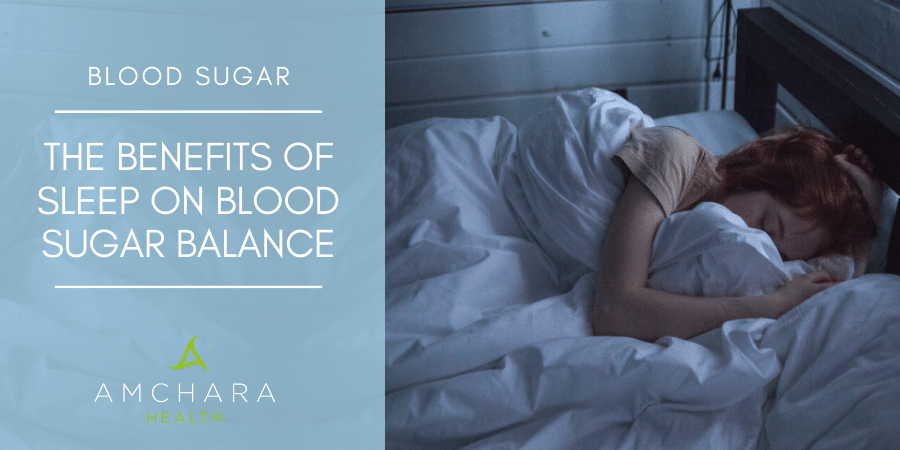Do you yearn for a good night’s sleep? Most of us are familiar with the effects of a lack of sleep, including lethargy, difficulty in concentrating, irritability and depression. But it may surprise you to learn insufficient sleep can also influence your susceptibility to Type 2 diabetes as well as increase your weight.
We always take an evidence-based approach and aim to provide you with actionable knowledge and tips to help you on your journey to optimal health. In this article we’ll look at the effect of sleep on your blood sugar balance, and we’ll give you some tips for improving your sleep quantity, as well as quality.
The importance of blood sugar control
Blood sugar balance is important because not only does stable blood sugar supply you with steady levels of energy throughout the day, but peaks and troughs in blood glucose can leave you less able to deal with stress and lead to sugar cravings, weight gain and ultimately contribute to the development of Type 2 diabetes.
When you eat, the amount of glucose in the blood increases. However, your brain needs blood glucose to remain within very narrow margins – too high a level can damage your cells, while low levels of sugar in the blood will starve the brain of fuel.
When blood sugar climbs too high, the pancreas releases insulin to bring it down again. It does this by allowing sugar access into your body’s cells where it can be utilised for energy.
Over time, if insulin is constantly being released, cells can become deaf to its message, sugar does not enter the cells and blood glucose remains high. The pancreas then secretes extra insulin in an attempt to encourage the cells to respond. This is known as insulin resistance.
The development of insulin resistance is a recognised risk factor for Type 2 diabetes.
The relationship between blood sugar and sleep
- Sleep quantity
Not getting enough sleep, even for a short period, can increase the risk of developing insulin resistance and Type 2 diabetes. In one study, restricting sleep to five hours for as little as one week significantly decreased insulin sensitivity in healthy people (1).
If insulin sensitivity decreases during the night, blood glucose levels may climb too high, and you may find you wake up in order to urinate.
In one study in the USA, regularly getting less than five hours sleep was associated with over twice the risk of developing Type 2 diabetes.
In fact, researchers concluded one night of disturbed sleep can detrimentally affect blood sugar balance by around one third – as much as six months on a high-fat diet.
One study linked reduced sleep with reduced function of the cells in the pancreas which produce insulin. This effect became more pronounced with age, suggesting we become less able to adapt to sleep deprivation as we get older (2).
But more sleep is not necessarily better – studies have also shown a relationship between habitually having more than nine hours sleep per night and increases in insulin resistance.
Experts believe optimal sleep duration is between seven and eight hours per night, although this will vary from person to person.
- Sleep quality
Sleep quality is a subjective measure referring to how long it takes a person to fall asleep, how many times they wake up during the night, and how rapidly they are able to get back to sleep after waking.
The quality of sleep obtained is also related to insulin resistance. One study found two nights of disturbed sleep fragmented by frequent waking led to a reduction of insulin sensitivity of 25% (3).
This is most likely because waking frequently through the night will decrease the amount of slow wave or deep sleep you obtain, which is the most restorative stage of sleep and plays a role in hormone balance.
Research preventing volunteers from entering deep sleep, without waking them, found insulin sensitivity also reduced by a quarter.
- Sleep timing
Your sleep-wake cycle is regulated by your circadian rhythm.
Although it’s unique to each of us, you will function better if you sleep according to your natural rhythm and don’t vary your sleeping patterns from night to night.
The effect of doing this has been studied in relation to shift-workers, who have a higher risk of developing Type 2 diabetes. Scientists found even slightly altered changes to the circadian rhythm our bodies prefer, over a prolonged period of five weeks, reduced blood sugar control by over one third (4).
Scientists believe insulin levels follow a distinct rhythm according to the time of day. Your body’s cells are generally less sensitive to insulin later in the evening.
We know sleep debt – a lack of sleep – can be repaid by sleeping longer in subsequent nights. For example in the above study, measures of blood sugar control did return to normal after nine nights of normal sleep. However, it’s best not to do this too often because it will disrupt your circadian rhythm.
Sleep and blood sugar influence each other
The relationship between blood sugar control and sleep is a two way process; not only does lack of sleep interfere with blood sugar control mechanisms as we’ve seen, but fluctuations in blood glucose levels at night can disrupt sleep.
If blood sugar crashes during the night, the body releases adrenaline in order to mobilise stored sugar from the liver. Adrenaline is a stimulatory hormone – one of the main hormones involved in the ‘fight/flight’ stress response – so if this increases during the night, you will inevitably wake up.
Sleep and hunger hormones
You also need sleep to regulate the hormones which control hunger.
Sleep deprivation increases levels of a hormone called ghrelin, responsible for stimulating your appetite. Sleep deprivation also decreases levels of leptin, the hormone which tells your brain you don’t need to eat.
This increase in appetite, particularly for carbohydrates, has been seen after just one night of disturbed sleep. It’s estimated sleep deprivation can result in eating an average of 385 additional calories per day, with an increased tendency to eat more during the evening, which can disrupt sleep still further (5). Weight gained in this way can contribute to more interference with blood sugar balance.
Lack of sleep also places stress on the body, potentially further impairing blood glucose control.
How to improve your sleep:
- Avoid alcohol. Although it may make you drowsy and so help you drop off to sleep initially, it reduces the amount of deep restorative sleep and you’ll often find you wake up during the night (6). As the night progresses, alcohol will cause a release of adrenaline, increasing alertness. Women appear to suffer from the sleep-disturbing effects of alcohol more than men, possibly because they metabolise alcohol more quickly.
- Don’t drink caffeine after lunchtime. Caffeine is a stimulant, so it will make it difficult for you to nod off. We are genetically predisposed to break down caffeine at a certain pace. The average time taken to break down 50% of the caffeine in your blood is around five and a half hours, although for some people it takes much longer than this, meaning the caffeine can hang around in your system for some time. Caffeine is contained in tea, coffee, chocolate and energy drinks. Enjoy a cup of chamomile tea instead.
- Establish a regular bedtime as far as possible to help keep your sleeping aligned with your circadian rhythm.
- Exercise during the daytime can help you sleep better at night, particularly if you are also able to get out into natural daylight for at least 30 minutes before midday.
- Ban electronic devices from the bedroom, including the TV. Make the bedroom the room for sleeping. The screens of these devices produce blue light which increases alertness.
- Don’t use any screens within one hour of bedtime and consider investing in an app to reduce the blue glare emitted.
- A warm bath with Epsom salts can relax your muscles as well as your mind and so help you relax into sleep.
- Meditation, deep breathing exercises or yoga in the evening can help calm your nervous system.
- Make sure your bedroom is dark. One study found just a single night of light exposure during sleep significantly increased insulin resistance, even if the volunteers had eight hours of sleep, starting at their usual bedtimes (7).
Takeaway
Improving the quantity, quality and timing of your sleep can sleep can significantly support your blood sugar control. Difficulties in sleeping can be physically and psychologically exhausting, so if you would like tailored advice to develop healthy sleep habits, Amchara’s Personalised Health experts are here to help you every step of the way.
We’re dedicated to providing you with insightful information and evidence-based content, all orientated towards the Personalised Health approach.
Did you find this article useful?
We would love to know your thoughts.
Let us know what your strategies have worked for you to improve your sleep.
Read this next:




